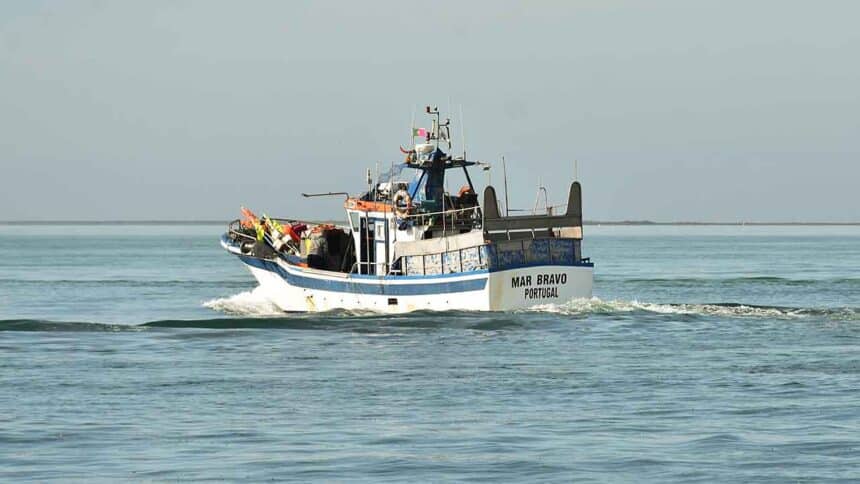Algarve’s desalination plant threatens financial ruin for “many families”
QUARPESCA (the association of Quarteira fishermen) has ridden into the mounting furore over plans to spend €90 million on constructing a large desalination plant off one of the posterbook beaches of the Algarve – warning that it will be “a tragedy” that could make it impossible for many families to make a living”.
“Desalination is a possibility that should be used as a last resort – when all other alternatives have been exhausted”, said the association in a statement – mirroring past comments by PAS, the platform for sustainable water, backed up by sundry academics in think tanks like SEDES.
This particular location – Praia da Falésia, rated one of the most beautiful beaches in the world – introduces a myriad of issues, not least the instability of the cliffs that will have to suffer drilling to allow the pipeline taking untreated brine out to sea.
Something APA’s recent press release on the fact that the plant already has a favourable environmental impact statement failed to mention were the concerns raised not only of the impact of drilling under/ around unstable cliffs, but the consequences of that drilling in the event of earth tremors (which the region frequently registers).
For fishermen, who refer also to the “very high energy consumption” of desalination, the worst aspect of this process is “the major environmental impacts” of tens of thousands of cubic metres of untreated brine being channeled into the ocean on a daily basis.
“The possible implementation of this project jeopardises the quality and quantity of fish” in the waters”, says the association – and this “will make it impossible for many fishing families who live off the sea to make a living”.
Fishermen will not accept “polluting and ruining their workplace” for any reason (not least a reason that so many feel is unjustified). They vow to “fight to the end against this environmental crime”.
This is just the latest ‘group’ of dissenters to the desalination idea, which already has landowners fighting expropriation demands; residents raising complaints and lobbying Euro MPs, and experts in organisations like PAS going carefully through the fine print of the ‘favourable’ environmental impact statement.
Campaigning lawyer Rui Amores has stressed this week that everything points to the premise that Águas do Algarve, which drew up the project, ‘banking on the ignorance of Algarvians’.
He too is going through the impact statement with a fine-toothed comb, highlighting so many areas where ‘negative impacts’ are admitted to, and then ‘discounted’ on the basis that they are “not significant”.
For fishermen, there is no doubt at all: a desalination plant will significantly, adversely affect their livelihoods.
The statement issued this week adds that fishermen are “perfectly aware of the problems caused by the lack of water in the Algarve (…) Not least because that same water (from the rain) contains important nutrients for the development and attraction of various species of fish to the coastal areas.
“Falésia beach is one of the most popular beaches for tourists. A source of pride for us Algarvians,” QUARPESCA adds. The construction of the desalination plant threatens all that and “contradicts European Union directives” (as PAS has already alerted) “because it doesn’t promote the protection of the Algarve’s coastal zones and sea and it doesn’t respect the basic principle of ‘do no significant harm (DNSH)’ (…) in public and private funding”.
The association has also expressed surprise that this type of undertaking is being planned “just five miles away” from a protected Marine Area – the Algarve Reef Marine Natural Park – Pedra do Valado – where “the aim is to preserve 1,294 marine species”.
How can such preservation be expected in the face of endless deluges of untreated brine?
As the Resident has said before, this is a fight that will continue for some time: institutional arguments that this plant will provide much needed water have been pooh-poohed by detractors who point out that it would provide ‘potable water’ for less than a quarter of the region’s resident population with unrecoverable environmental consequences and at a dizzying financial cost.
APA has conceded that the final go-ahead is “subject to compliance with a number of conditions”. That number is more than 100, and many of those conditions are considerable
Águas do Algarve, the company responsible for the region’s water supply, and which manages infrastructures such as dams and wastewater treatment plants, continues to insist the region needs this plant, work on which is scheduled to be completed by the end of 2026 – the final year for the use of funds under the PRR (Plan for Recovery and Resilience, funded by the European Commission).
The Algarve is still in a state of (extreme) hydrological drought: dams are nowhere near the levels they need to be, and restrictions on water use are already ‘in place’ (meaning cuts of 25% to agriculture, and 15% to the urban sector).
But no matter how many times these phrases are trotted out, there is a growing body of dissent to spending €90 million on a massive desalination plant before carrying out so many other ‘water management/ conservation measures’ that are generally ignored, and would carry minimal (if any) negative environmental impacts.


























